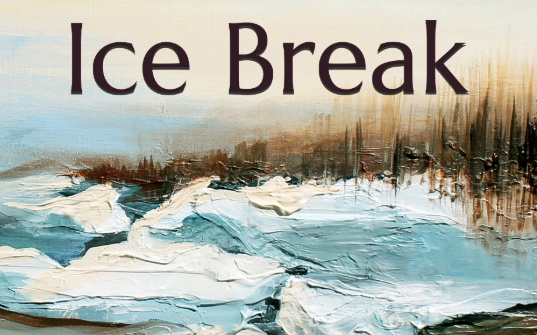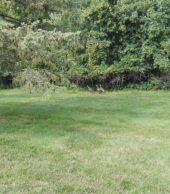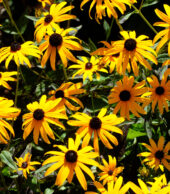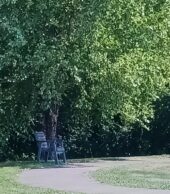Ice Break: Annotated Selections from a Book of Poems
Writers too infrequently have the opportunity to witness people in the act of receiving their work. I was recently afforded that privilege as I shared a poetry reading with my friend and colleague Victor Klimoski. The experience encouraged me to annotate a handful of poems for those who could not be there. Victor released his new collection Natural Wonders about the time I released Ice Break and the two nature-infused works held a synergy too rich to let pass by.
A poetry reading affords listeners two great benefits. First, they hear the poem in poet's own voice, gaining a sense of tone and pacing as the writer envisioned the piece. While a blog doesn’t offer quite the same benefit, the second does apply. Through a poet’s description of their own work, listeners also find a wider context for a particular poem. I’ll weave some of that context between the poems below.
Ice Break
Just weeks ago, before Spring’s electric greens of grass and trees, ice still covered Lake Phalen in St. Paul. It's easy to forget how hard spring worked to arrive and to persist through late snows. That really has been my sense of life change. We work and wait a long while, only to forget quickly as the change finally comes. While I am glad for those to whom break throughs come swiftly and neatly, but I simply don't see it that often, not in my life, nor in the stories of those with whom I journey as a spiritual director. Still, that sense of slow, persistent change has given me confidence and trust in the process, and it's made me more watchful and grateful for the tiniest movements, or sometimes the loud ones that signal something unseen is finally happening.
+++
On the far edge of winter
a frozen lake quakes and groans
as a warm sunrise hints at spring.Its slabbed topwater,
fused by arctic nights,
kept silent vigil until now.Hear the hard water whisper.
Feel its echoed crack,
the rumble of its low-pulsed boom.Wait in stillness here
until the heart remembers—
any change sounds like this.The familiar thaws unevenly,
creaking, groaning toward
open waters and greening shores.
Wine Press
WH Auden, an American Poet, said that a poem is "the clear expression of mixed feelings." At least for me, this seems to ring true. I do not set to page to teach or to instruct others, necessarily; I write to sort out mixed feelings and then keep revising until I can find my own clear expression. Sometimes that writing seems like it might have value to others beyond me, but not always. I remember Victor commending to us in a writing class once the discipline of writing a poem a day. At the time, our children were small, we were not sleeping, and I simply could not. But I still remember the personal realization that a poem took shape for me over the course of a week. Because I scribble, walk, diddle, work, wonder, revise and my natural pace is days before I find something closer to a clear expression of my mixed feelings. By that point, I have a record of what I most want my future self to remember from whatever was experienced here in the present. This is the spirit of writing gave birth to Wine Press.
+++
Any draft is crafted at a wine press,
where bushels of words harvested from
a vineyard ripe with many more
are heaped inside a worn opening,
crowded carefully and pressed together
by a long, slow force of will.
Then, like a trickle of thick crimson,
a paragraph or two seeps through
the narrowest of stained cracks.The time has come for waiting.
Let unseen sugars break down,
fermenting words into something
familiar yet entirely new.
Days become weeks as ideas
are vigorously, then gently refined.
Every line began with a yes—
a yes to the harvest,
then to the pressing,
then to the waiting.
In time you will taste the wisdom:
young wines bold and wild,
old wines aged with longsuffering genius.
Two Waters
I was a bit in the doghouse with my wife, Beth, because I had gone to print with this collection before she even read all the poems I included. Being in the doghouse made me grateful for her interest in two respects. First, I am grateful for the freedom she affords me to do my own thing. I realize that it probably all looks the same from her vantage point. Whether Sam's nose is pointed into a book, a notepad, or a computer, he's holed up in the cold, dark basement, which she does not find nearly as charming as I do. Meanwhile, she is busy finding joy in planting flowers and baking banana bread and reading to the kids so that our life might have more beauty. I respect and am grateful for the ways she enables my freedom and adds her own poetry to our lives. I am also grateful to be in the doghouse, because it reminds me how we sometimes leave our muses too quickly behind. I want to be more mindful of the ways that my actions are inspired by great love and how swiftly I can lean into those actions without lingering sufficiently with whatever has stirred my heart. This is the heart of my section of poems called Anima, a tribute to the powerful experiences of the feminine that awaken in me a heart-full-ness I would not otherwise know.
+++
She says he is a river,
ever flowing downstream,
pressing on to what comes next.She sees herself
a lake calm and clear,
basking beneath sun and moon.Both signs of natural order,
though honest ways to live,
carry their own dangers.His currents may one day slow—
will she still be seen
on the upstream horizon?Her eye may turn inward—
will she be as much at ease, then,
with what lies within her depths?To preserve some symbiosis,
the river must learn to yield,
the lake to test its shore’s reach.Trust this comingling,
waters feeding waters,
sharing one common source.
The Trickster
One of the practices that shapes me most deeply is meeting people one-on-one to listen to their stories of the spiritual life. An entire section of my poems attempts to speak to what I continue to learn through that sacred privilege. And one of the lessons is to listen just as gently and compassionately to what I hear my own self speaking. Somehow, it's easier to be patient with the mixed emotions of others than to accept my own. This story from the wee hours of the morning says something of that.
+++
What mischief rises in the night
when everyone else is sleeping?
The house quiet, neighbors locked in,
the city’s hum set to dim.An unwelcome guest begins to stir,
tossing the mind, turning the body.
Too hot?, Too cold?, it whispers and grins,
Something forgotten or too much said?This trickster robs sleep
with hints and half-truths,
content to amuse itself
in spaces emptied of day.Press it away or chase its lures
and fall further yet from sleep.
Or, let it come and wander away
like smoke into darkness
over a wick burned out.
Call Me by Name
My colleague and friend Kiely Todd Roska and I have taken to complimenting one another as "water buffalos," after a line in the fine poem by Marge Piercy called "To Be of Use." Piercy helps us see how satisfying it is to be teamed up other people who are truly willing to set at the task before us. Working diligently, with hope and with purpose, is core to my understanding of what it means to participate well in this life and I am exceedingly grateful for yokefellows who help me find my place and who show me how to change the world, one small act at a time. Among the many Sisters, staff, and partners around here I could mention, I'd like especially to honor Carol Rennie. As long as I have known her, she has avoided flattery and attention, preferring always to focus on the mission and on doing what must be done. If you've ever called Carol "Sister," you'll have heard her say, "My name is Carol." This poem is in thanks for her long and faithful service and everything she has taught me about what it means to live and serve Benedictinely.
+++
Call me by name,
not by some title
to flatter me
or get me to do
whatever it is you want.
I have heard
a lifetime of sounds,
learning to cherish
one voice above all,
a voice that comes in whispers,
a voice that comes in storm.
I listen for the one
who has always led me,
calling me by name.
Next Thing
Some people have high aims about prayer and meditation. Mine are, perhaps, more simple. I just want to be slow and steady and showing up often enough that at some point I learn to open my heart more fully to the present. I'm consumed most days with pressing on deeper into the task list, never quite as fast as I seem to add new things to the bottom. Some part of me trusts, at least hopes, that the practice of prayer will eventually ease that drivenness and help me accept that Divine Love is present here and now, no matter what I do or do not do. I'd love to choose my next action from that grounded, centered place.
+++
When I am here,
it is there.
When I am now,
it is then.
The next bite,
a perfect morsel.
The next project,
a worthy difference.
The next friend,
a better companion.
Next, next meaning
this, this is never
quite enough.
Maker of moments,
ease my drivenness.
Teach me how
to love this
here and now.
Legacy
Zoe and Nathanael, our kids, tell me that when I die they're going to bury me on boot hill, which is a spot beneath our cedars and beside the woodpile where all the dead mice are tossed for the owls. No thank you, I say every time. I deserve a place on the bluff, overlooking the valley and all the progress we've made caring for the woodland that may someday be their responsibility, or their great grandchildren's. Truthfully, I don't really care. They can spread my ashes anywhere (preferably on our property), I just don't want to be in a box, sealed away from the earth. Our woodland is a holy place for me that makes all places holy. This poem speaks to my hopes that others may visit and feel the same.
+++
Memorials and headstones
are too obvious.
Give me something simple,
like a path gently worn
through bluffland woods.Let those who follow walk
beneath tall cedars,
where sounds and textures
so enchant them
that the way itself
goes unnoticed.When they find friendship
with that holy place,
let them remember
the one who lived,
who dreamed, who made
this path, step by step.
Let them set their minds
to long kinship
and keeping the way
for those yet to come.And if none follow,
I will still rest in peace
knowing this path will return
to the same lush wild
through which I walked
and found
beauty surpassing
the finest etched granite.
My Favorite from Victor's: This Day Before Us
Victor is not Polly-Annaish, which makes him a better friend to me. He can explore and accept the dark with me, but he has an ingrained instinct to get bored with the dark and to start seeking the light. I've seen him do this over and over again and I believe his poems carry forward this sentiment. He will be honest, ever honest, about the heaviness before us; Simultaneously, he will turn our hearts boldly toward The Day Before Us.
+++
On any one day,
on a day like this
when the sun sweeps back
the last traces of night,
when the heavy dew of September
ripples across trimmed lawns:
on a day like this,
it is time to begin again.
We have lingered too long
under the traces of regret,
plowing furrows too shallow,
never straight enough
for the harvest we imagined.But today we will consider
how rich the field,
the seed we need,
the skills it takes
to husband the Earth.
We will look up,
breathing in the morning air
and opening our hearts
to what lies just beyond
the edge of the sea of dew.

Learn more about Samuel Rahberg, his own writing, art as spiritual practice, and his upcoming events.






